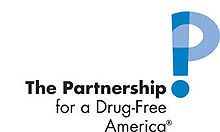Is My Child at Risk for Using Drugs?
Partnership for a Drug-Free America Web Site Offers Assistance
The Partnership for a Drug-Free America has created a great website for parents and guardians to assist them in dealing with their child’s possible use of alcohol and other drugs. The website is very user friendly and contains many brief videos to assist parents. TIME TO ACT! (http://timetoact.drugfree.org) is divided into two sections: “I think my child is using” and “I know my child is using.” Each section is subsequently divided into various areas.
“I think my child is using” covers: First Step: Ask; Look for Signs; Learn Risk Factors; Why Teens Use; and Need to Know. The following information was taken from the “Is Your Teen at Risk” section. In order to best help your child, know the risk factors that contribute to drug use and discuss those factors with your child.
Individual Factors:
• Begins drinking or using drugs at an early age (10-12 years
old)
• Teen’s thinking that drinking and/or drug use isn’t that
harmful
• Attention Deficit Hyperactivity Disorder
• Mental health disorders such as depression, anxiety and conduct
disorders
• Rebelliousness; frequent breaking of rules
• Unable to control impulses
Issues Among Peers:
• Rebelliousness
• Friends who drink or use drugs
• Friends with favorable attitudes toward drug or alcohol use
• Friends who think drinking or drug use isn’t that harmful
• Friends who begin drinking or using drugs at an early age (10-12
years old)
• Gang involvement
Family Issues:
• Family history of addiction or current addiction
• Trauma to child (divorce, death of family member, child abuse,
neglect, etc.)
• Little or no parental supervision
• Little or no monitoring of child by parent
• Lack of expectations of child
• Inconsistent or severe punishment
• Daily family conflict: ongoing arguing, hostility, physical
abuse
• Lack of concern about child’s drug use
• Parents aren’t clear about their feelings about their teen’s use
of drugs or alcohol
• Parents who are suffering from depression or other mental
illness
School-Related Issues:
• Academic difficulties beginning in elementary school
• Learning disability
• Placement in special education or remedial track in school
• Slipping grades, not turning in homework
• Skipping school
• Lack of commitment to school
Issues in the Community:
• Easily available alcohol and drugs in the community
• Community laws and attitudes toward drug and alcohol use
• Negative attitudes, lack of investment and lack of resources in
neighborhoods (parks, community centers, athletics, etc.)
• Poverty
• Media glamorization or portrayal of drinking and drug use without
consequences
Under each category on the website, parents/guardians can find suggestions on what they can do.
Some kids are more likely to use than others. Knowing the common factors that often accompany drug and alcohol use by youth can help parents understand when to be more aware, when to start a conversation with your kids or take action to change a potentially harmful situation. If you have a concern about your child, please contact the SCIP Team Leader at your child’s school for assistance.
SCIP is funded in part by: Nebraska Department of Health and Human Services Behavioral Health Services, Lincoln Public Schools, Region V Systems, and United Way of Lincoln and Lancaster County.


 Launch the media gallery 1 player
Launch the media gallery 1 player